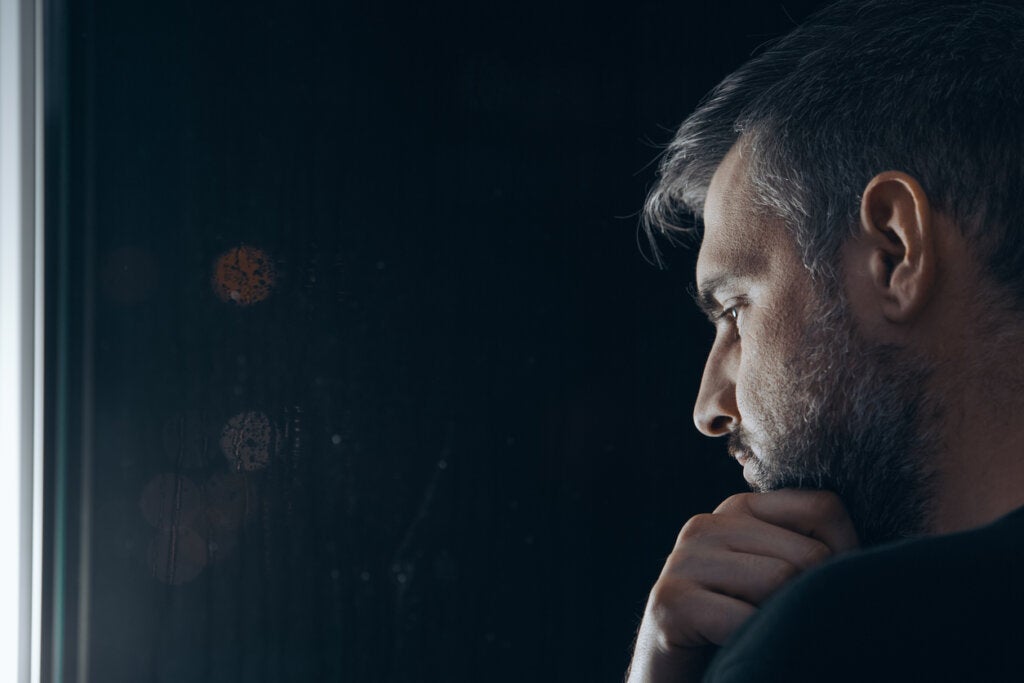As human beings, we have a precious gift for which we also have to pay a high price: we can think for ourselves. What’s the cost? Our awareness of death.
Once we become aware of our own finitude, there’s no turning back. From that moment on, the threat of our disappearance remains latent. It isn’t easy to live every moment with the certainty of our destiny, the fact that we’re going to die. It’s like trying to look at the sun, we can only tolerate it for a while.
Our fear of death
Fear of death is a natural and reasonable emotional reaction. It tends to clash head-on with our survival instinct while nourishing it at the same time. The fear takes on new forms as we grow older as we find different ways to mitigate the uncomfortable feeling that death produces in us.
In childhood
The leaves falling from the trees and the beginning and end of the seasons are the first contact that we have with the concept of the end. Indeed, between the ages of three and five, children only partially understand human death. In fact, they conceive of it as reversible, believing that the deceased person is sleeping or has gone on a trip and will return at some point.
Until the age of nine, death is personified under the name of some character or spirit and the typical fears of ghosts and monsters frequently appear. Nevertheless, between the ages of nine and twelve, children are generally able to understand death as an irreversible, permanent, and inevitable state.
Whether it’s due to the death of a grandparent, pet, or an isolated comment from a classmate, there comes a time when all parents must talk to their children about death. To do this, they should define it as a natural process and use the appropriate language according to the child’s cognitive and emotional maturity.
In adolescence
In adolescence, anxiety about death explodes with all its fury as loss fully acquires the nature of the irreversible. At this age, many are captivated by the idea and might visit cemeteries at night, watch horror movies, participate in violent digital games, and expose themselves to risky situations. In fact, teenagers defy death by putting themselves in danger.
In adulthood
With any luck, death anxiety enters a lull during early adulthood. Indeed, when we’re busy working, studying, or raising a family, the fear of death doesn’t tend to be so present.
However, as we get closer to the end of life, worrying about death becomes repetitive and truly uncomfortable.
More than fear
Thanatophobia is an extreme fear of the possibility of dying. It corresponds to an anxiety disorder whose intensity becomes so extreme that it drastically impacts the sufferer’s daily life, to the point of causing them to avoid social situations or contact with any object they perceive as a potential danger.
Thanatophobia should be treated by a psychotherapeutic approach. This focuses on the thoughts that maintain the symptoms of anxiety.

Looking at death
In Leo Tolstoy’s novel, The Death of Ivan Ilyich, the protagonist, dying of pain, discovers that he’s dying badly because he lived badly. He finds out that by protecting himself from death he also protected himself from life. He then undertakes a short but profound transformation and begins to enjoy the time he has left.
It’s not enough to close your eyes, grit your teeth and clench your fists, and wish with all your might to enjoy life to do it effectively. In fact, knowledge concerning finitude also plays an essential role.
“It is not enough to think about death, but to be always in front of it. Then life becomes more solemn, more important, more fruitful and more joyful.”
-Stefan Zweig-
Countless writers, playwrights, musicians, and filmmakers have dedicated a large part of their lives to producing works linked to death. It seems that they simply want to find the answer. Certainly, artistic expression tends to be applauded for representing the emptiness and anguish that death generates in us.
On the other hand, some of those who are terminally ill, rather than give in to despair, are positively transformed, almost as a reflex action. They become grateful for what life offers them, prioritize the important, and dismiss the trivial. They celebrate every moment and get closer to their loved ones in an unprecedented and profound way. In fact, it appears that sometimes, the only way to start enjoying life is to come face to face with death.
“Though the physicality of death destroys us, the idea of death may save us.”
-Irvin Yalom-
Enjoying life
Fortunately, there are other, less extreme events that can act as a wake-up call for us. For instance, the end of a relationship, when our children leave home (empty nest syndrome), retirement, or a significant birthday (thirties, forties, even our nineties), etc.
These are all situations that can help us become aware of our own being, ask existential questions, and make decisions according to our well-being, greatly enriching our existence. Indeed, keeping death in mind is a distinct advantage.
The post Our Fear of Death appeared first on Exploring your mind.



















Comments